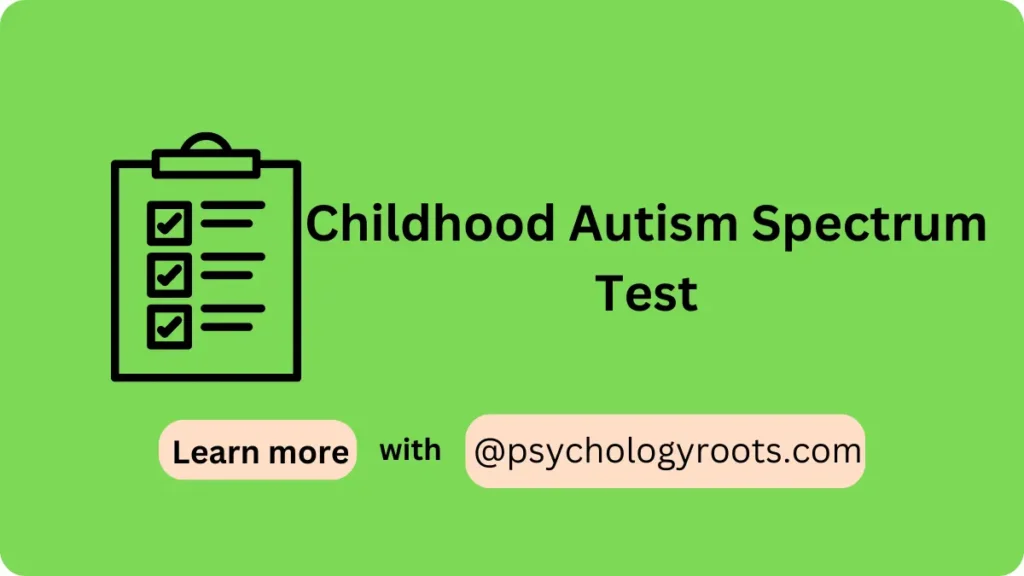Table of Contents
Childhood Autism Spectrum Test
Here in this post, we are sharing the “Childhood Autism Spectrum Test”. You can read psychometric and Author information. We have thousands of Scales and questionnaires in our collection (See Scales and Questionnaires). You can demand us any scale and questionnaires related to psychology through our community, and we will provide you with a short time. Keep visiting Psychology Roots.
About Childhood Autism Spectrum Test
Scale Name
Childhood Autism Spectrum Test
Author Details
Fiona J Scott, Simon Baron-Cohen, Patrick Bolton, and Carol Brayne
Translation Availability
Not Sure

Background/Description
The Childhood Autism Spectrum Test, or CAST, emerged from a need for early detection of Autism Spectrum Disorder (ASD) in children. Developed by a team at the Autism Research Centre of Cambridge University, it specifically targets children between the ages of 4 and 11.
The CAST functions as a screening tool, completed by parents or primary caregivers. It avoids complex procedures and instead relies on observations of a child’s behavior and interactions in everyday situations. The questionnaire format gathers information on a wide range of social, communication, and imaginative behaviors. By analyzing these aspects, the CAST aims to identify children who might benefit from a more thorough evaluation for ASD.
This screening tool plays a valuable role in facilitating the early identification of ASD. Early detection is crucial because it allows for timely intervention and support. The CAST serves as a first step to ensure children with ASD receive the help they need as soon as possible.
Administration, Scoring and Interpretation
The Childhood Autism Spectrum Test (CAST) is designed for straightforward administration by parents or primary caregivers, eliminating the need for a trained professional. Here’s a breakdown of how the CAST is typically administered:
- Self-administered Questionnaire: The CAST comes in the form of a questionnaire specifically designed for parents and caregivers to complete on their own. This format makes it accessible for use in various settings, including primary care visits, schools, and even at home.
- Focus on Observations: The questions within the CAST center around the caregiver’s observations of the child’s behavior and interactions. It doesn’t involve any complex tasks or assessments for the child to perform.
- Yes/No Format: The CAST typically utilizes a yes/no format for each question. This simplifies the process for caregivers and ensures clear responses.
- Completion Time: The CAST is designed to be efficient, usually taking around 20 minutes for parents or caregivers to complete.
- Scoring and Interpretation: While a qualified professional can provide further insight, the CAST often comes with scoring instructions and potential cut-off scores. These scores offer an initial indication of whether a more in-depth evaluation for ASD might be recommended.
Reliability and Validity
The Childhood Autism Spectrum Test (CAST) has strengths and weaknesses regarding its reliability and validity. Here’s a breakdown of both:
- Test-Retest Reliability: Studies show the CAST has good test-retest reliability, meaning scores tend to be consistent when the test is administered twice over a reasonable time frame. This indicates the CAST captures relatively stable aspects of a child’s behavior.
- Inter-Rater Reliability: Research suggests the CAST may have weaker inter-rater reliability. This means scores can vary depending on the caregiver completing the questionnaire. This highlights the importance of considering different perspectives during the evaluation process.
- Sensitivity: The CAST boasts high sensitivity. This means it’s unlikely to miss a child with ASD (low false negative rate). This is a positive aspect for initial screening.
- Specificity: However, the CAST has lower specificity. This translates to a higher chance of false positives, where children without ASD score high enough to warrant further evaluation. This necessitates following up with a comprehensive assessment by a specialist to confirm or rule out ASD.
Available Versions
39-Items
Reference
Scott, F. J., Baron-Cohen, S., Bolton, P., & Brayne, C. (2002). The CAST (Childhood Asperger Syndrome Test) Preliminary development of a UK screen for mainstream primary-school-age children. Autism, 6(1), 9-31.
Important Link
Scale File:
Frequently Asked Questions
What is the CAST?
A screening tool to identify potential Autism Spectrum Disorder (ASD) in children aged 4-11.
Who completes the CAST?
Parents or caregivers, based on their observations of the child’s behavior.
Is the CAST a diagnosis?
No, it’s a screening tool. A high score suggests further evaluation by a specialist is needed.
How is the CAST administered?
Parents/caregivers fill out a questionnaire focusing on the child’s behavior and interactions (yes/no format, takes about 20 minutes).
Is the CAST reliable and valid?
Somewhat reliable (consistent scores over time). Lower reliability between different caregivers. Good at identifying children with ASD (high sensitivity) but might also flag children without ASD (lower specificity).
Disclaimer
Please note that Psychology Roots does not have the right to grant permission for the use of any psychological scales or assessments listed on its website. To use any scale or assessment, you must obtain permission directly from the author or translator of the tool. Psychology Roots provides information about various tools and their administration procedures, but it is your responsibility to obtain proper permissions before using any scale or assessment. If you need further information about an author’s contact details, please submit a query to the Psychology Roots team.
Help Us Improve This Article
Have you discovered an inaccuracy? We put out great effort to give accurate and scientifically trustworthy information to our readers. Please notify us if you discover any typographical or grammatical errors.
Make a comment. We acknowledge and appreciate your efforts.
If you have any scale or any material related to psychology kindly share it with us at psychologyroots@gmail.com. We help others on behalf of you.